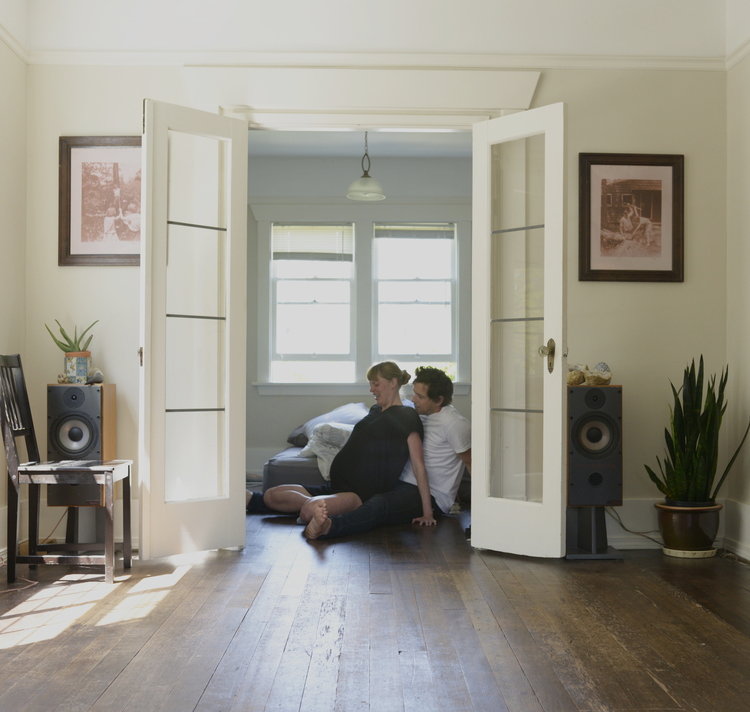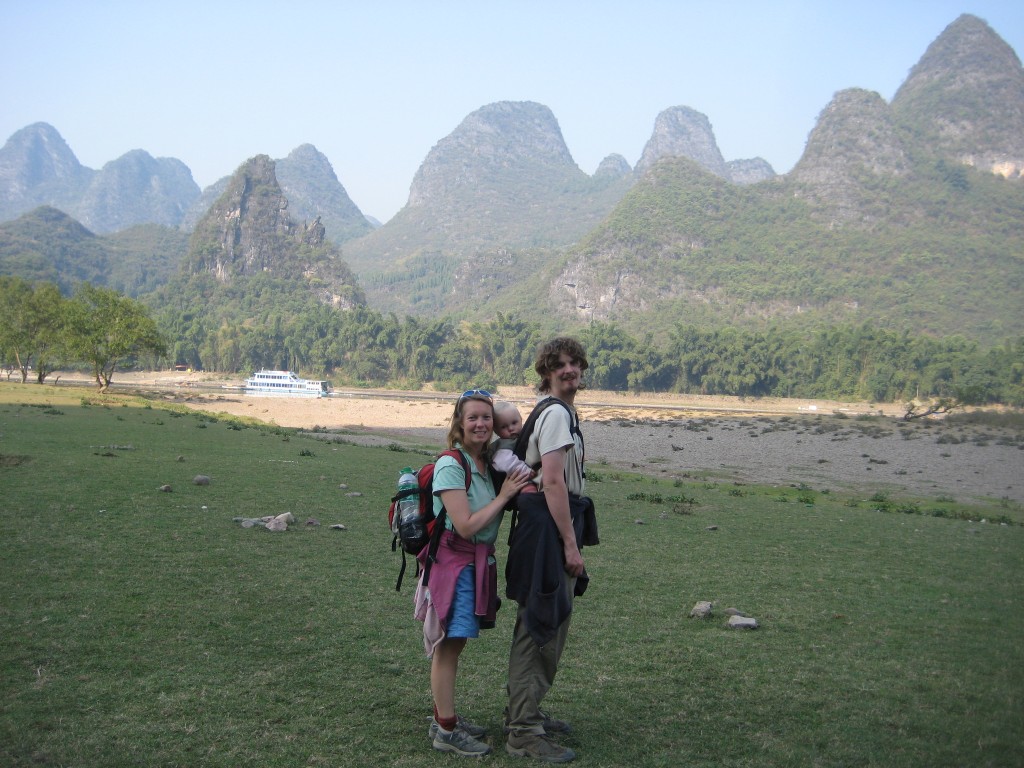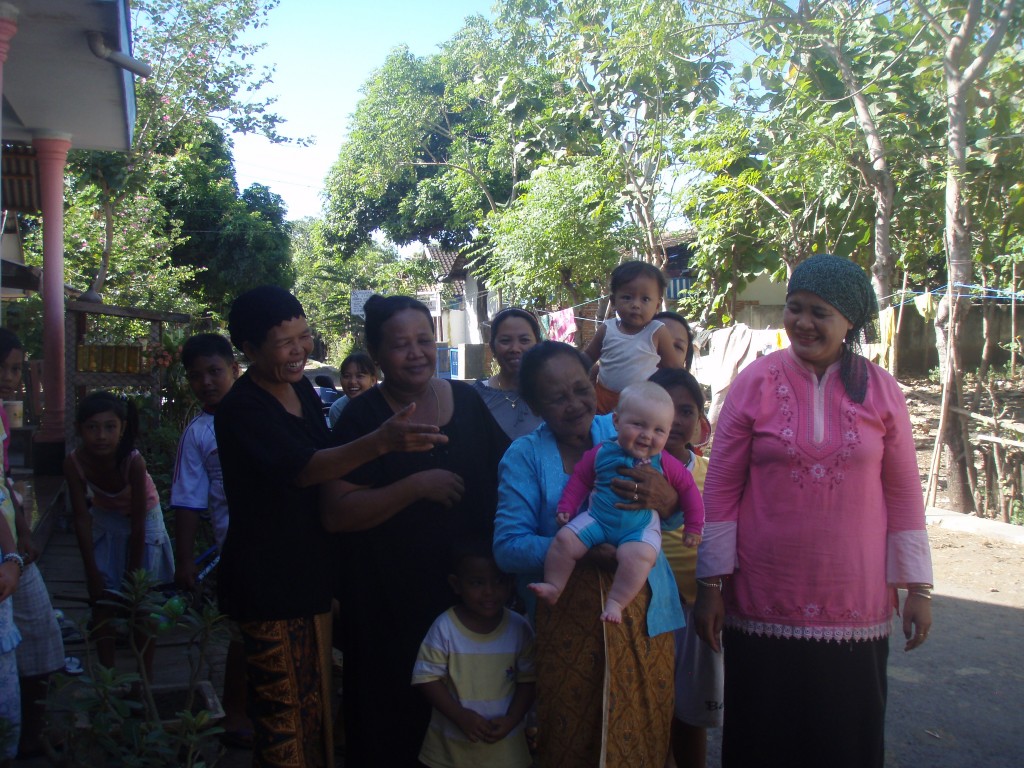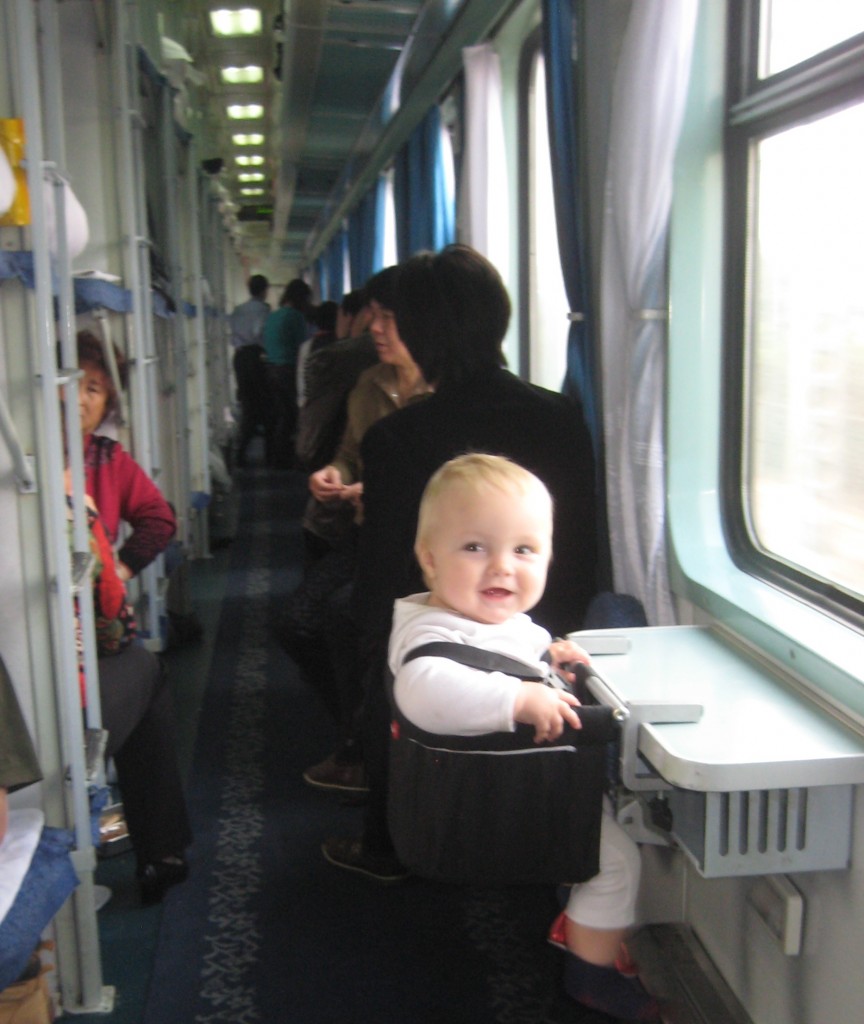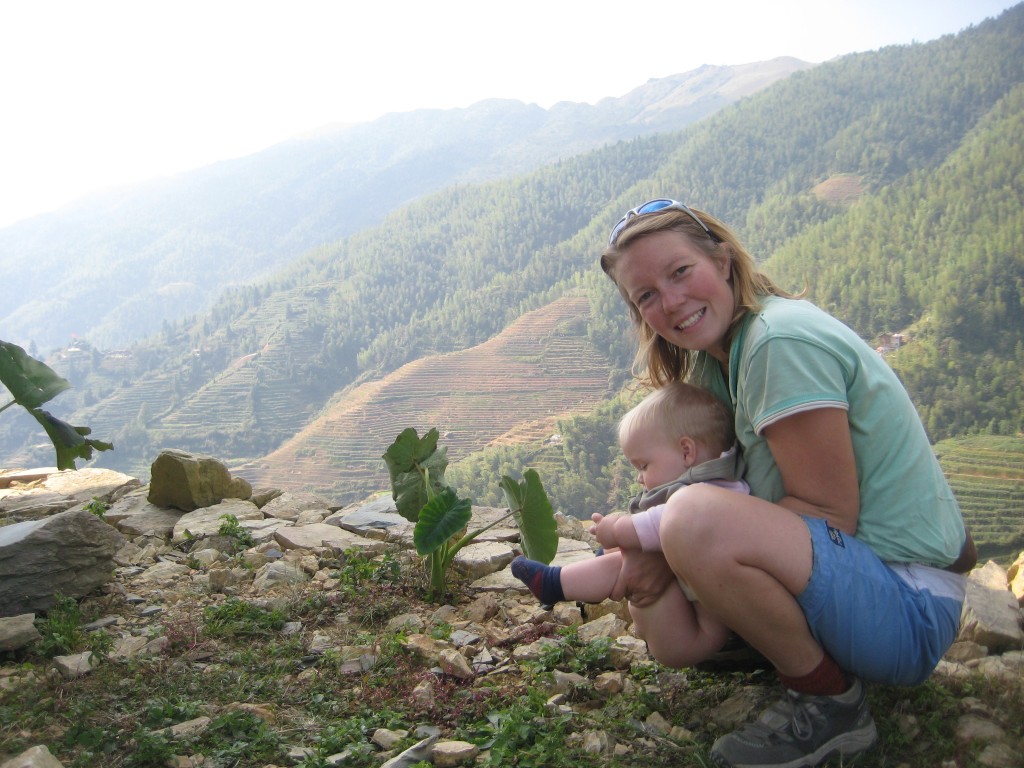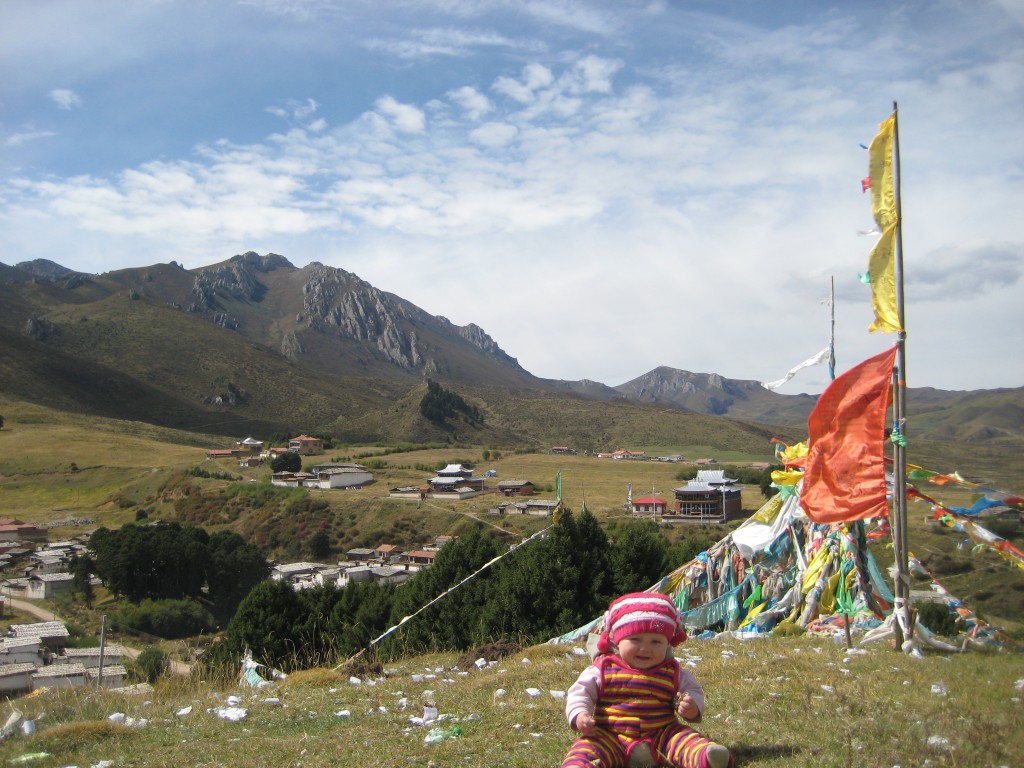As an avid traveller myself, having spent many months backpacking in Asia, Australia, South and Central America, and at one point sailing from Colombia to Spain, maintaining a sense of adventure and exploration is something that I really value. When I think about the possibility of having my own children, one of my biggest concerns has been how I could continue to live a non-mainstream lifestyle, free to travel the world and experience other cultures the way only a backpacker can.
This summer, I was hired as a birth doula for an amazing, inspiring family, who proved to me that you can have any type of life that you want, even with children.
I am so excited to share this guest blog post with you: a story about parents who have maintained their identities as backpacking travellers and gave their 6 month old daughter an incredible introduction to life!
Read, enjoy, and get inspired… and please post comments below!
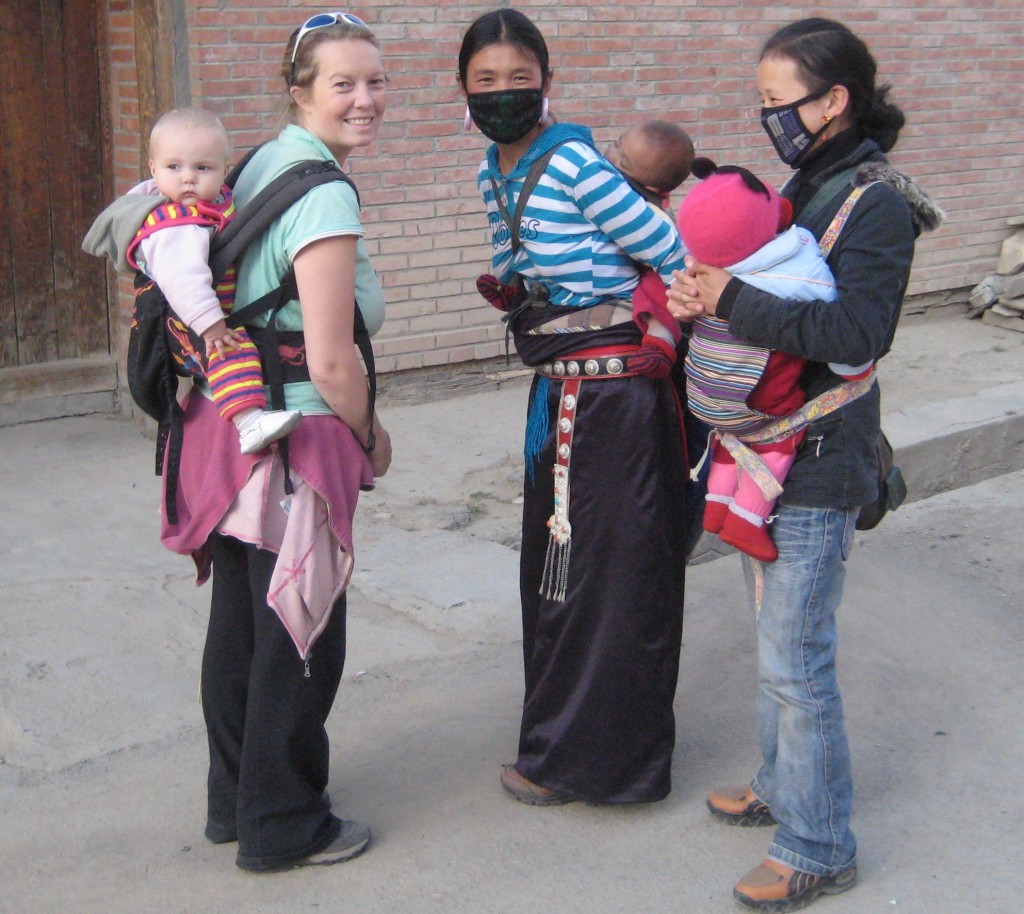
Charlotte Watson
Comparing baby carriers with some young Tibetan mothers, Xiahe, Gansu Province China
Backpacking With A Baby
Guest post written by Charlotte Watson (nee Bathurst)
Although we were desperately excited to start our family, my husband and I both feared that we might have to forego our vacations of independent travel for more conformist and conventional resort based holidays.
But, our new baby’s curious yet laid back attitude allowed us the opportunity keep that aspect of who we are, and from when our first child, Beatrix, was 6 months to 12 months old we both took parental leave from work and took her backpacking round Eastern Asia.
As much as possible we tried to keep an open mind and open itinerary so that we could just go with the flow. Our only self-imposed restriction was keeping to low risk Malaria areas. Beatrix was an amazing little traveler, adjusting with total ease to new environments, surroundings, cultures, climate and the constant attention she received wherever we went. We started in Indonesia, in Bali then across to Java; up to Singapore; Malaysia Peninsular; Thailand; China; Vietnam; Macau; Hong Kong and the Philippines where we celebrated Beatrix’s first birthday.
We learnt so much from the people who we met along the way, and it really confirmed to us our belief that there are many different yet valid ways to raise children. We relaxed our urban, western ideals of controlling the environment we exposed our baby to, and instead embraced the differing opportunities that lay before us all.
The Chinese in particular were fascinated by us, although somewhat perturbed that we didn’t have a grandmother with us. They seem petrified of babies being cold and constantly scolded us for not dressing her in enough clothes, whilst puffing cigarette smoke in her face as they took it upon themselves to feel her forehead. I don’t think I will ever get used to some of their cultural norms such as the lack of queuing, and how I feared more than once that we would get crushed getting on to trains but once on, the very people I feared would have trampled on us were so kind and caring despite the language barrier, wanting to share the vast quantities of processed food that they always take with them. One long train journey the conductor rounded up all the children on the train to come and listen to me sing nursery rhymes to Beatrix. Differing cultural norms to personal space was another area in China that we had to overcome. It still feels surreal when I recall how one woman unlatched Beatrix and took her out my arms whilst I was breastfeeding her so that her husband could take a photo of her holding Beatrix.
Indonesia and the Philippines really seem to embrace the idea that it takes a village to raise a child and we received so much help with Beatrix with people passing her along a crowded bus whilst we tied our bags on the roof. I would be highly suspicious of any stranger at home offering to hold my baby for me. I lost track of the number of times we sat down to eat and she was swept out of arms, lavished with affection and attention, paraded round to the neighbours, then reluctantly returned when we finished our meal. I genuinely don’t think it was just because of her blonde hair, big eyes and chubby cheeks, but because they adore children and see them as communal property. What really left an impression on me was that despite their baby obsession, the South East Asians always respected Beatrix’s body language at being man handled by them. They rarely asked us if it was OK to hold her, but rather always asked her using a hand gesture that we came to nick-name “clappy-clappy, reach-reach”. It struck me how little trust over-cautious North American parents place in their infants own instinct. Any anxiety I felt was outweighed by how well Beatrix was thriving with these new experiences.
So often we felt like film stars, mobbed by their fans with people constantly looking at us; pointing; waving; wanting their photos taken with us. Whereas on previous backpacking trips, my husband and I felt were seen just as tourist dollars and treated with suspicion when we ventured off the normal tourist trails, now we were embraced; invited into the homes of real locals; enthusiastically introduced to their families and neighbours. Our baby was the key that unlocked the door of the traveling experience we always strived to achieve.
Based on our experience, these are the tips that made this trip work for our family:
- We traveled as light and minimalist as we could to enable us to carry all our luggage plus baby between us. This reduced the stress of needing to find porters or trolleys, and some worry about pickpockets and being robbed.
- We took a 70 litre backpack that Daniel carried, whilst I took Beatrix in the baby carrier, and our daypack with laptop. We had a very lightweight umbrella stroller but didn’t find it too useful, and preferred to use the baby carrier.
- Our only piece of proper baby paraphernalia was the Phil & Ted’s “Me Too” highchair as I felt strongly about not wanting to spend meals with a baby on my lap.
- Instead of taking real toys we used our imagination and initiative to make up games, or use items that were around us anyway such as water bottles and chop-sticks, which thankfully she never got tired of playing with.
- Wherever possible we stayed in either private rooms of hostels or homestays. As well as being cheaper than hotels, we found that there were more facilities for us to use such as kitchens. Homestays really allowed us to see more of the real area too, and more of an opportunity to interact with locals.
- For long journeys we tried to travel by sleeper train or bus to minimalize the amount of time that we had to entertain a baby in a confined space. Trains also allowed you the opportunity to get up and walk around. Many a train trip we would have people wanting to take Beatrix from us so that they could play with her.
- We bedshared so didn’t need to worry about finding accommodation with cribs. This was just so acceptable and normal in Asia, that it really contrasts to the dangers to bedsharing that Canada seems so focused on.
- We preferred to avoid accommodation with air conditioning, and instead just allowed ourselves to customize to the climate.
- We have always practiced Elimination Communication so were able to just take 10 pre-fold cloth diapers and 2 covers which we hand washed. We also embraced the Chinese diaper-free approach and bought Beatrix some split-crotch pants.
- I breastfeed the whole time which meant we didn’t have to worry about whether we needed to supplement with the local food that we all eat, and aided her immune system in adjusting to the local conditions. I was acutely aware of how this might have been offensive in some Muslim areas but actually I was constantly reassured that skin exposure was not offensive for the purpose of nourishing an infant. In the Philippines it is normal for children to be breastfed up to 3 or 4 years old, and I had many a local mother giving me the thumbs-up when they saw me nursing. In contrast, many Malaysians see using formula as a status symbol of their wealth, so were very confused as to why seemingly rich, western Caucasians were breastfeeding. One young mother asked me in a very concerned tone “why does your husband not give you money to buy the baby’s milk?”
- We leant a little of the local languages, even just enough to say the baby’s age, her gender, and where we were from. Beatrix also learnt to wave “hello” and “goodbye” in many of the local languages which people seemed to adore.
- We had a bedtime ritual that meant that despite her bed and surrounding smells and noises always being different, Beatrix always knew it was bedtime. This included reading “Good Night Vancouver” every night as her bedtime story to remind her of her home!
Adapted from an article featured on the Canadian Parents website.
*Charlotte Watson runs Vancouver’s Downtown Moms, Babes & Toddlers meetup group and has been a guest speaker at the Birth Takes a Village free monthly prenatal group.
Have you done something adventurous as a brand new parent? Share your comments below to inspire other new parents!
Don't miss out on other original childbirth articles like this one! Join other mothers and birth professionals on my mailing list!
